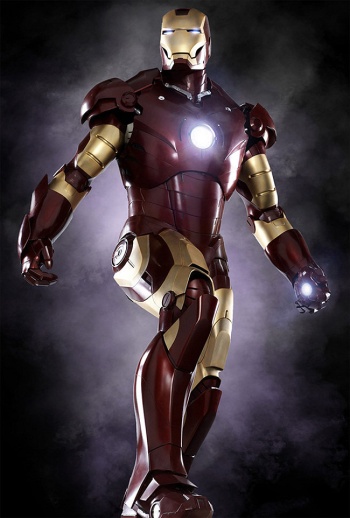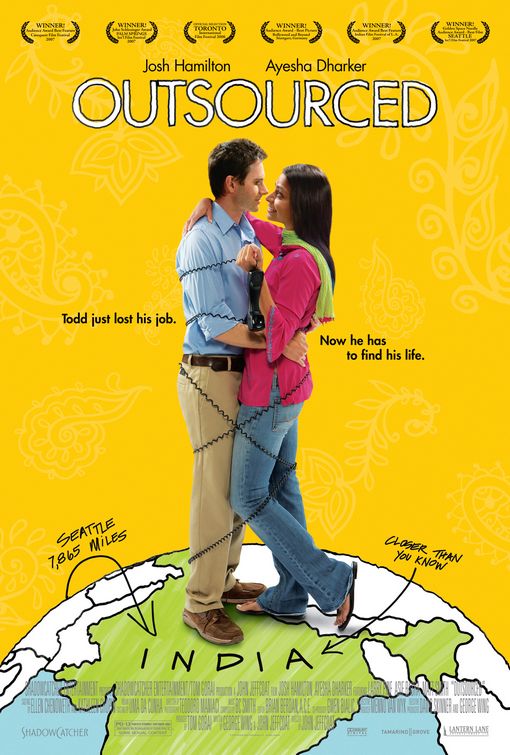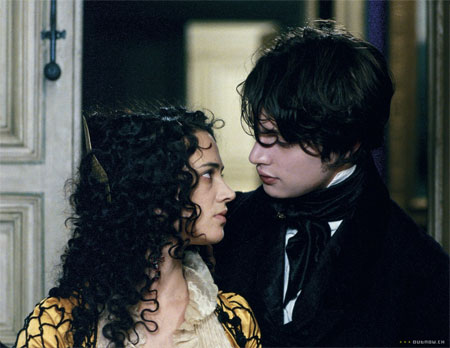 My Favourite Films of 2008
My Favourite Films of 2008
 My Favourite Films of 2008
My Favourite Films of 2008
1. The Dark Knight (Christopher Nolan, USA): Living up to its hype, Nolan delivers a dark knight that's the closest so far to Frank Miller's 1980s re-imagining of the caped crusader. It also incorporates elements of more recent noir style Batman graphic novels such as the Long Halloween and Dark Victory, with their mixing together of super-villains and mafia gangsters. Nolan's Batman is darker than Burton's 1989 version and lives in a very real looking Gotham City, a far cry from the fantastic art deco monstrosities of the earlier film. Adding to its realism is Nolan's restraint with the use of special effects, with those included merging very nicely with live action shots. The opening shots of a group of masked men robbing a bank was closer to a Scorsese film or Sidney Lumet's Dog Day Afternoon than a superhero blockbuster. Heath Ledger's Joker is a true psychopath and agent of chaos, his performance creating a very believable and scary master criminal. Aaron Eckhardt plays against type as the crusading Harvey Dent aka Two Face. Gary Oldham as Jim Gordon, Michael Caine as Alfred, and Maggie Gyllenhall as Rachel Dawes all put in solid performances. The Joker's musings about the hypocrisy of the general populace about hero worship is only partly refuted by events in the film - there is a difference between masked vigilantes and vicious criminals, but it's not as clear as the typical teenage comic-book fan might think. My only complaint was that the fight sequences in the last half hour or so of the film were so darkly lit, frantic, and jumbled together that it wasn't always possible to figure out what was going on. Just when I thought Iron Man was the best superhero film!
2. Iron Man (Jon Favreau, USA): Robert Downey Jr. makes yet another comeback playing Tony Stark in a role that's hard to imagine anyone else doing (once you've seen the film, that is). Perhaps the best Marvel superhero film to date, it stays true to the comic book origin story, updating Stark's captors from the Viet Cong to an Islamic militia. Stark's construction of the Iron Man Mark I and II suits has a sense of realism to it, and needless to say Downey plays the character with all his flaws showing. The film also moves Stark from rabid supporter of the American military-industrial complex to ambiguous pacifist - admittedly one willing to blow up weapons depos full of Stark Industries hardware. My only critique is that Jeff Bridges' character of Obadiah Stane seems to go berserk and make himself his own set of armour a bit too easily, though his transformation is based on the 1980s comic book villain Iron Monger.
3. Outsourced (John Jeffcoat, USA/India): This film is
impossible not to like. Charming and witty without being full of belly laughs,
it tells the story of one Todd Anderson (Josh Hamilton), a customer service
manager who is "outsourced" to India to train Indian service reps in the ways of
American culture. As one would expect, the teacher becomes the
 student,
quickly learning the ways of Indian culture. Jeffcoat, who also co-wrote the
film, steers a clever course between the Scylla of cultural condescension and
the Charybdis of romanticizing Indian society: we see the colour and spice
alongside the filth and poverty of India. Helping "Mr. Toad" (as the Indians
refer to him at first) is local beauty Asha (Ayesha Dharker), a strong-willed
woman who has one foot in traditional Hindu culture and another in modernity,
much like India as a whole. The last scene in the film (not giving away too
much) was almost a carbon copy of the final scene in Bill Forsyth's brilliant
1983 comedy Local Hero, also about an uptight American businessman who
goes to a foreign land (in the case of the earlier film, the northern coast of
Scotland) with preconceived ideas, only to learn a gentler, more karmic way of
living - I suspect that Local Hero was the inspiration for Jeffcoat's
Outsourced. And there's a gentle but clear critique of the corporate greed
associated with outsourcing to boot, and of the American consumer's complicity
in it: at one point Asha asks an American customer on the phone if he's be
willing to pay $200 more for domestically made kitsch - he, of course, takes the
cheaper foreign-made product. Hamilton and Dharker have good chemistry together:
their romance seems real, not something out of a Bollywood musical or a
Hollywood blockbuster. Though it's no Citizen Kane, there's nothing bad
one can say about Outsourced: it's a perfect little indie gem telling the
story of how culture shock isn't all that shocking.
student,
quickly learning the ways of Indian culture. Jeffcoat, who also co-wrote the
film, steers a clever course between the Scylla of cultural condescension and
the Charybdis of romanticizing Indian society: we see the colour and spice
alongside the filth and poverty of India. Helping "Mr. Toad" (as the Indians
refer to him at first) is local beauty Asha (Ayesha Dharker), a strong-willed
woman who has one foot in traditional Hindu culture and another in modernity,
much like India as a whole. The last scene in the film (not giving away too
much) was almost a carbon copy of the final scene in Bill Forsyth's brilliant
1983 comedy Local Hero, also about an uptight American businessman who
goes to a foreign land (in the case of the earlier film, the northern coast of
Scotland) with preconceived ideas, only to learn a gentler, more karmic way of
living - I suspect that Local Hero was the inspiration for Jeffcoat's
Outsourced. And there's a gentle but clear critique of the corporate greed
associated with outsourcing to boot, and of the American consumer's complicity
in it: at one point Asha asks an American customer on the phone if he's be
willing to pay $200 more for domestically made kitsch - he, of course, takes the
cheaper foreign-made product. Hamilton and Dharker have good chemistry together:
their romance seems real, not something out of a Bollywood musical or a
Hollywood blockbuster. Though it's no Citizen Kane, there's nothing bad
one can say about Outsourced: it's a perfect little indie gem telling the
story of how culture shock isn't all that shocking.
4. Australia (Baz Luhrman, Australia): A huge roller coaster of a film that is really three genre set pieces stuck together with Australian superglue. Aussie expatriates Hugh Jackman and Nicole Kidman return home to star as "The Drover" and Lady Sarah Ashley, whose long-forestalled romance drives the film. The first twenty minutes or so comprises an old-fashioned slapstick comedy about class differences; the middle third is a John Ford-style western about herding cattle through the outback and defending Lady Ashley's ranch against the greedy King Carney (Bryan Brown) and his villainous henchman Fletcher; the final third a World War II drama about the Japanese attack on the northern port of Darwin and its consequences for the main characters. Mixed in throughout is a commentary on white racism against the aborigines. Though uneven, Luhrman brings his typical over-the-top energy to the film. Despite the cavils of critics about its polyglot nature, there's one thing we can say for sure: it was never boring!
5. Battle in Seattle (Stuart Townsend, USA/Canada/Germany): Having read a number of critical reviews before seeing this film, I went into the theatre with meagre expectations, only to be reminded of the truth behind all political films: if you like the politics of the film, you're far more likely to enjoy the film. And vice versa. Having said that, Stuart Townsend's docudrama of events (both real and fictional) surrounding the late 1999 protests against the meetings of the WTO in Seattle, Washington is a moving film that submerges its anti-globalization message into the chaos of the street demonstrations and the private lives of the protesters and police he focuses on quite well. Despite the broad sweep of the film, several performers stand out as real individuals: Woody Harrelson as the gung-ho cop who questions his beliefs when his wife (Charlize Theron) is beaten by thuggish riot police; Michelle Rodriguez as Lou, the tough and sexy veteran protester; and Andre Benjamin as Django, the ideologue and street comedian. By no means a simple pedagogical exercise, Townsend makes us reconsider one of the central issues of our time, a process that's largely responsible for the economic mess the world finds itself in as 2008 draws to a close: the value of globalization. Has it made the world a better place? For those who, like me, severely doubt this is true, Townsend's film is worth more than a dozen Hollywood epics about fast cars and petulant teenagers.
6. Frost/Nixon (Ron Howard, USA): Ron Howard's flashback to David Frost's landmark interviews with the disgraced ex-president is presented as a battle of wills between Nixon, determined to restore his tarnished reputation, and Frost, who is in danger of being stuck in a long career as a second-rate talk show host. Frank Langella's Nixon captures the essence of the man without resorting to a cheap impersonation, while Michael Sheen's personality disappears into Frost, who is presented as the confused underdog until he finally produces the "gotcha" moment in the final interview. The background manoeuvring is also presented in a far more entertaining way that we have a right to expect from a movie about a TV interview. A glimpse at an interesting moment in media history.
7. The Unknown Woman (Giuseppe Tornatore, Italy): This Hitchcockian film weaves together a present-time story about a Ukrainian woman named Irena trying to eke out a living as a domestic servant in Italy with flashbacks of her horrid mistreatment by a pimp called "Mold" while she was seemingly earning her living as a prostitute. Irina's after something, but it's not clear what it is until the end of the film. She's also done some bad things, and her past is quickly catching up to her. As she looks out her rear window across the street to the apartment of her well-to-do employer, we know there's a plan in her head, but it takes a while to piece together just what that plan is. Mixing together vengeance, sex and class, this is a mixture of romantic drama and crime thriller with a gothic flair, including a swirl of giallo. Belissima!
8. Vicky Cristina Barcelona (Woody Allen, USA/Spain): After spending some time in artistic doldrums, Woody Allen returns to fine form in this complicated romantic comedy/drama set in Barcelona. Sensible Vicky (relative newcomer Rebecca Hall) and flighty Cristina (Scarlett Johansson) move to Barcelona for the summer. Vicky is about to marry a dull business type back in New York, while Cristina on an endless search for the perfect romance without knowing what she wants. Things heat up very quickly when artist Juan Antonio (Javier Bardem) propositions both ladies, offering them a weekend of sightseeing and passion in his home town. They go: Vicky doesn't cotton to the suave Juan Antonio at first, while Cristina is all too ready to jump into bed with him (though she gets sick, forestalling their romance for a time). I won't spoil the film for those who haven't seen it: suffice it to say that its first act offers viewers an interesting romantic triangle and meditation on the dialectic of momentary passion vs. rational commitment, while the second half features some bitter hilarity after Juan's crazy ex-wife Maria Elena (played with great energy by Penelope Cruz) shows up, throwing herself back into his life like an amorous hand grenade. Their arguments, centered on Maria Elena's twisted emotional logic, are a real comedic treat. As others have noted, Cruz is a far better actress in her native language . Don't worry: Woody's neurotic New Yorkers are still there, transplanted to Spain. Yet he sets up a nice contrast between the dull conventionality of the bourgeois Americans and the passionate, though unstable, intensity of Cruz and Bardem, with Woody seeming to prefer the latter. And the film ends with no cheap bromides about love conquering all. Though the camera work is quite conventional, one would have to go back to the early 1980s to find an equally well constructed Allen film.
9. Religulous (Larry Charles, USA): Bill Maher's worldwide search for the meaning and purpose of religious belief is certainly a didactic piece of work, funny in parts, absurd in others. Yet it works as a sardonic travelogue, a mild version of Borat. Maher gives the defenders of monotheism a fair chance to defend themselves, being harder on his own native Christianity than on Judaism and Islam. Not surprisingly, they come up short. This film won't convert anyone who isn't already converted, yet as an intelligent defense of atheism it stands out amidst the pious declarations of American politicians in an election year in favour of blind faith. Maher's final monologue is dead on: it is dangerous to be lead by people who believe in deeply irrational things such as raining frogs, parting seas and virgin births. And we get to meet Jesus at a Florida Disneyland for Christians.
 10. La Veille Maitresse [The Last Mistress] (Catherine Breillat,
France): An uneven though compelling French costume drama about a young man's
attempt to separate himself from his sultry mistress and marry an aristocratic
woman respected by society. The film features fairly long dialogue scenes where
we are allowed some insight into the thinking of the main characters. Some might
find these scenes rather dull, yet they're essential to the "dangerous liaisons"
style plot which explores the nature of erotic obsessions, not to mention
romantic fidelity. There's also some fairly graphic sex scenes filmed through a
feminist lens, largely devoid of any eroticism. Asia Argento gives a quirky and
breathy performance as Vellini, the supposed "last mistress" of aristocrat Ryno
de Marigny: her first appearance, reclining on a couch, slaps us in the face
with her "femme fatale" status. She sells the audience on the reality of Ryno's
obsession for her. The sets, costumes and locations are outstanding, bringing us
back to post-Napoleonic France two hours. A somewhat hollow feeling film that
nevertheless compels one's attention.
10. La Veille Maitresse [The Last Mistress] (Catherine Breillat,
France): An uneven though compelling French costume drama about a young man's
attempt to separate himself from his sultry mistress and marry an aristocratic
woman respected by society. The film features fairly long dialogue scenes where
we are allowed some insight into the thinking of the main characters. Some might
find these scenes rather dull, yet they're essential to the "dangerous liaisons"
style plot which explores the nature of erotic obsessions, not to mention
romantic fidelity. There's also some fairly graphic sex scenes filmed through a
feminist lens, largely devoid of any eroticism. Asia Argento gives a quirky and
breathy performance as Vellini, the supposed "last mistress" of aristocrat Ryno
de Marigny: her first appearance, reclining on a couch, slaps us in the face
with her "femme fatale" status. She sells the audience on the reality of Ryno's
obsession for her. The sets, costumes and locations are outstanding, bringing us
back to post-Napoleonic France two hours. A somewhat hollow feeling film that
nevertheless compels one's attention.
11. W (Oliver Stone, USA): Stone's biopic of the soon-to-be ex-president presents his life as a somewhat shallow Oedipal struggle with his father George. Though it would have been easy to turn W's life into one long comedy, to his credit Stone does try to understand him: the dream sequence of Bush standing in a Texas ball park waiting to catch a fly ball that never comes sums up the seeming emptiness at the core of his life. Josh Brolin really inhabits the title role, doing something considerably better than a mere impression of Bush. The supporting players are strong: Richard Dreyfuss as Dick Cheney, James Cromwell as George Sr. and Jeffrey Wright as Colin Powell, though Thandie Newton's Condoleezza Rice comes across as little more than comic relief. What's surprising is that Stone's film is not a simple screed against the Bush administration's foreign policy gaffs, though he does present Cheney and Paul Wolfowitz as insidious empire builders. Entertaining and funny, almost sympathetic to its main character, but clearly showing us that he was out of his league as "leader of the free world."
12. Priceless (Hors de prix) (Pierre Salvadori, France): A somewhat old-fashioned though cynical comedy featuring Audrey Tatou as the manipulative man-chasing gold-digger Irene and Gad Elmaleh as the initially naive waiter Jean, set in the sunny climes of the French Riviera. Jean falls hard for Irene, who mistakes him for a rich playboy, and milks him for all he's worth before exiting stage left. Yet all is not lost: Jean becomes a gigolo himself, all the while yearning for Irene. Tatou's comic talents are as steady as ever, making a fairly clichéd scenario into something quite charming. Not a classic, but a sweet bon bon all the same.